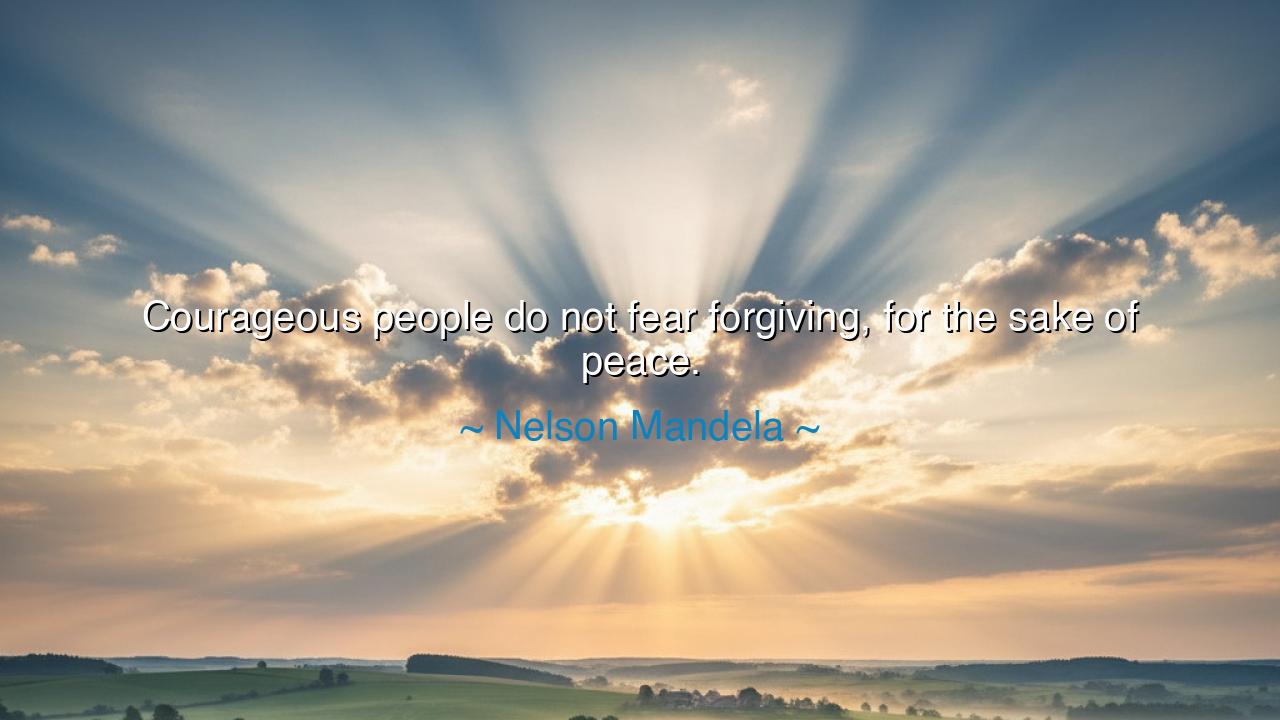
Courageous people do not fear forgiving, for the sake of peace.






In the immortal words of Nelson Mandela, the sage who turned imprisonment into enlightenment, we hear a truth carved deep into the soul of humankind: “Courageous people do not fear forgiving, for the sake of peace.” These words, born from the heart of a man who endured unimaginable injustice, are not gentle platitudes — they are the living flame of wisdom forged in suffering. Mandela knew what few have the strength to understand: that forgiveness is not weakness, but the highest form of courage; that to seek peace is not to yield, but to conquer oneself.
The world remembers Mandela as the liberator of South Africa, yet his greatest victory was not over his enemies, but over his own bitterness. For twenty-seven years he sat behind prison bars, robbed of his youth, his family, his freedom — yet he emerged not hardened, but healed. Where others would have sought vengeance, he sought reconciliation. Where others would have cried for blood, he cried for peace. In forgiving those who had wronged him, he shattered the chains that hatred had forged, proving that true power lies not in retaliation, but in restraint.
In the ancient world, philosophers spoke of heroes who mastered the battlefield, but Mandela was of a rarer kind — one who mastered the battlefield within. His words echo the timeless wisdom of sages and prophets: that the hardest war is the war against the self. To forgive is to turn one’s sword inward, to slay the pride, the resentment, the desire for revenge that darkens the human heart. It is to say, “I will not let hatred rule me.” Only the courageous can do this, for forgiveness demands a bravery greater than any fight — the bravery to love when love has been denied.
Consider the story of Mahatma Gandhi, who, like Mandela, faced oppression with peace as his weapon. When his people were beaten, he refused to respond with violence. Instead, he taught them the power of the soul — ahimsa, the victory of compassion over cruelty. He once said, “The weak can never forgive. Forgiveness is the attribute of the strong.” Mandela carried this same torch, proving that forgiveness, when born from courage, is not surrender but strength purified of hatred. Together, these men remind us that history’s greatest revolutions are not of weapons, but of hearts transformed.
Forgiveness, however, is not a forgetting of wrongs. It does not mean denying pain or excusing evil. Rather, it is the deliberate choice to rise above it — to break the cycle of vengeance that devours generations. Mandela understood that South Africa’s wounds could not be healed by punishment alone. Through the Truth and Reconciliation Commission, he invited both victim and oppressor to speak, to confess, to weep, to begin again. It was not an easy peace; it was a painful peace — one earned through humility, empathy, and courage. For true peace, as he knew, is not the absence of conflict, but the triumph of understanding over anger.
The message of this quote is as ancient as it is urgent. From the time of the prophets to the modern age, humanity has been bound by the illusion that power lies in dominance. But Mandela’s words remind us that the truest victory is the peace that comes from forgiveness. When we forgive, we reclaim our strength. We say to the world: “You may have hurt me, but you will not define me. You may have wounded me, but you will not own my spirit.” This is the essence of courage — the fire that burns without destroying.
And so, dear listener, let this wisdom be written upon your heart: do not fear forgiving, for forgiveness is not a gift to your enemy — it is a liberation of your soul. In your own life, when betrayal cuts deep, when injustice tempts you toward rage, remember Mandela. Remember that every act of forgiveness plants a seed of peace that may one day shade a nation. The world is not healed by hatred; it is healed by the courage to love despite it.
Therefore, walk boldly in this truth: be among the courageous people who do not fear to forgive. Speak peace where there is anger. Offer mercy where there is pride. For those who can forgive in the face of pain become the builders of a brighter world — a world where love endures, and peace, born of courage, reigns eternal.






AAdministratorAdministrator
Welcome, honored guests. Please leave a comment, we will respond soon